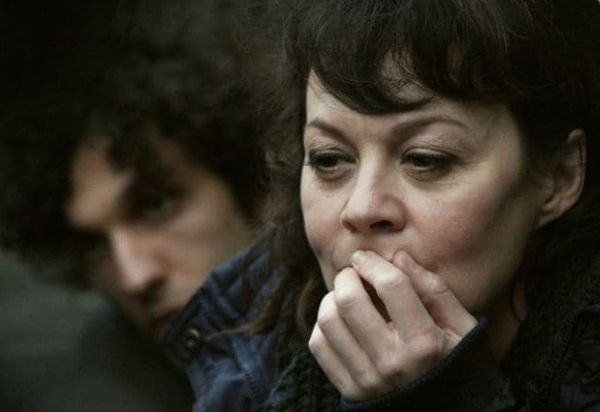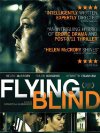Eye For Film >> Movies >> Flying Blind (2012) Film Review
Flying Blind
Reviewed by: Andrew Robertson

There is a technical discussion - quite an involved one, regarding a Remotely Piloted Air Vehicle, a drone - this aircraft does not fly quite the way they want it to, and so changes must be made. "Can we sacrifice payload?", to which the answer is no. The Americans have both bombs and missiles, and so must the Ministry of Defence. The politics of envy, straight off, but a second part - the notion of the boundary layer, the region which seperates the laminar flow of air over a wing from the turbulent chaos just above said aerofoil.
Envy, then, and smooth surfaces running over agitation. Throw in a brusque condemnation of vortex generators, and in a few credible discussions of aerodynamics we've got the interpretative weight for a very human drama. Flying Blind takes its time, but it knows where it's going, and it's very good.

Helen McCrory (most famously Narcissa Malfoy, but a TV veteran too) is Frankie - a doctor of aeronautics, a part-time lecturer at Bristol University, and a leading expert in leading edges, a wizard of the wind tunnel, and a single woman too. She meets Kahil, played by relative newcomer Najib Oudghiri. To call it a whirlwind romance is to underestimate its complexity.
Let's briefly return to aerodynamics - air is obviously a gas, but as speed increases it starts to behave as if it were a rigid entity - Busemann called them "streampipes". So here, as Frankie plays the 'fast woman', things become incompressible, difficult. It's not that either model of the behaviour of air is incorrect, it's that in certain contexts other systems of understanding work better. What follows is a difficult piece of navigation. As Frankie learns more about Kahil she finds herself switching from one set of equations to another, trying to understand what's going on. However, she's not the only one calculating.
McCrory and Oudghiri are brilliant - they've a good chemistry, when things are good, bad, better, worse. There are some excellent supporting performances too, but this is at heart a two-hander, but the onus is on poor Frankie. There are some standout moments: the treadmill, metaphorical or otherwise; an interrogation in a conservatory, which could only have been more emblematic of modern Britain if there had been a cold cup of tea; a moment by the dockside with a kebab.
This is director Katarzyna Klimkiewicz' first feature, and it's a promising debut. There's been praise for the clean composition, but what's particularly telling is the blurring of order and disorder - the "clean air" above the boundary layer, the turbulence below - it's there in sets, actions, performances, and in combination it's uplifting.
Naomi Wallace and Bruce McLeod write, based on an idea by Caroline Harrington - Wallace and McLeod have collaborated previously, on 2009's The War Boys, and she has a background as a playwright. There's a certain staginess here, not in a negative sense - more an awareness of tableaux, in that there are many static moments, often haunting - islands of balanced forces among dynamic instability. The ending is particularly strong. The passage of events leaves us with something that distinctly resembles a wake.
The film ably manages the switch from a romance into a thriller, but for all that does come across as a little reductionist - both love and international politics in the age of the Global War on Terror are complicated. Aircraft with variable functions (swing wings and the like) often suffer from weight issues, but here weightiness is a useful goal. As a human-scale story in that context, Flying Blind may not be pushing the envelope but it looks good trying.
Reviewed on: 25 Jun 2012

















